Every year on August 19th we celebrate World Humanitarian Day. The purpose of this day is to raise awareness of the efforts of professionals supporting people in crises around the world. This year’s theme is dedicated to Women Humanitarians.
By choosing this particular group we want to honour women’s tireless efforts to help people in need and shed light on additional challenges that women in particular face.
Being away from friends and loved ones are issues all humanitarians face, women however have to tackle additional challenges and risks. These range from not being taken seriously as a (young looking) woman in often highly patriarchal societies and work environments, conflicting social norms and additional security threats, including all forms of gender-based violence. National colleagues and refugee volunteers frequently find themselves in the toughest spots and at the same time remain often unseen and unheard. It is about time to share their stories. Because these women just rock!
I have the gratifying pleasure of currently working in a female only team of roughly 60 Bangladeshi and Rohingya women on a programme that provides educational opportunities to female Rohingya refugees over the age of 14. Interviewing some of these amazing women for this blog has once more revealed the daily battles many women professionals around the world have to fight besides ‘just’ performing in their jobs.
In both the Rohingya and Bangladeshi communities’ girls as a rule drop out of school when they get their period or get married. This interruption in their education automatically makes it harder for women to get a job, particularly in senior positions. If a girl drops out of school because of getting married, she subsequently often spends her days doing household chores and caring for her husband, children and in-laws, consequently family support is of uppermost importance and anything but to be taken for granted.
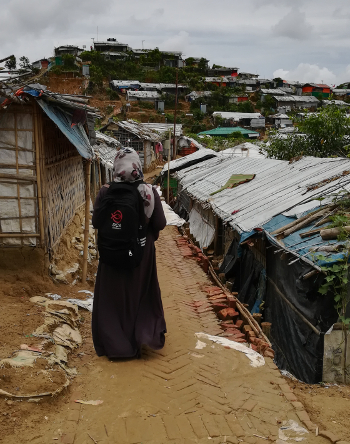
Tamara walking through camp on her way to a home-based learning session.
The aforementioned circumstances were also Tamara’s reality when she got married as a 17-year-old girl. Yet, her life has changed a lot since then. Now, aged 25 years, she says ‘I am an empowered woman now and people see that I bring home good money’. The journey to this point was hard, and she nearly gave up more than once. Some of her family did not approve the path to a career that she chose, and she is still struggling to meet expectations, both her familiy’s and her own. Tamara was fortunate to have a husband who supported her through those challenging times.
Dipa is another DCA staff member who has always been supported by her family, but still faces a hard time with not always being there for her family as this is what is expected from her as a daughter. Work life balance is even harder if these expectations are higher.
A supporting family is a luxury Rohingya DCA volunteer Fatima can only dream of. After getting married at the age of 15 out of love, she was abandoned by her family. Marriages are normally arranged by a girls’ parents in her community. Fatima now lives with her 3-year-old son in one of the refugee camps in Southern Bangladesh. Her husband left her for another women, staying in the same area as she does, thus bringing even more shame on her. Support from him or her family cannot be expected. Fatima, however, still feels guilty and obliged to support her family, as this is a daughter’s duty.
Besides social norms that make it harder for women to have a career of their own, security is often a major issue. Fear of sexual harassment is also often used as an argument to limit women’s movements in order to protect them and at the same time reinforces traditional social norms. My female colleagues are harassed for not fully covering themselves, being on the road on their own after dark, being unmarried, for working, etc. While I am lucky enough not to understand what is being said and ‘only’ have to deal with unpleasant glances, my native colleagues do understand all these undermining comments. This leads to a general feeling of insecurity.
So what drives them on to still keep going, to still keep on fighting?
“Over 50% of the population in the Rohingya community are female. We as women have to help them and ensure women have access to facilities and services”, shares Dipa her opinion when asked what motivates her as a woman to work in this field.
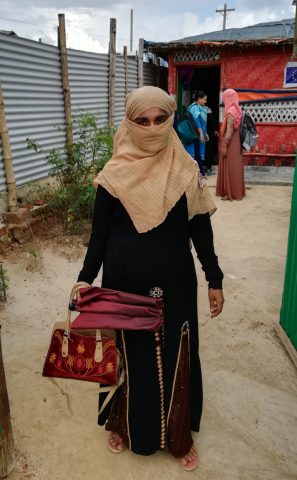
Fatima leaving the Women and Girls safe space to go home to her 3 year old son.
Others insist that it is their responsibility to support the most vulnerable and at the same time very rewarding when walking through the camp and feeling the support of the refugee community. Fatima and Sayema, who are volunteers from the Rohingya community and teach Burmese at DCA centres, tell us how much they enjoy coming to the Women and Girls Safe Space where they feel safe and protected. They are both teachers and participants at the same time, passing on their knowledge in Burmese, while improving their skills in other areas. Furthermore, they feel proud of getting educated. Sayema informs us that her family respects her as she can help them now with their documents.
‘Education can empower people and I feel a responsibility to help the Rohingya’ says 25-year-old Tamara working as a teacher in the refugee camps in Southern Bangladesh.
Involving women in each and every workplace, especially in the field of humanitarian work is essential as it eventually changes societies. In a community where women were not allowed to leave the house on their own, you can now see women in all kinds of different positions, from front line field staff up to managing positions. I am deeply convinced that despite the fact that we as a community still have a long way to go to not only ensure women have the same opportunities on paper but supporting them in tackling the additional challenges, it’s us who set the ball rolling. However, organisations have to undertake responsibility in acknowledging the existing inequality and better support women at all levels in pursuing their careers. It is time for a change!
Petra Weissengruber
The writer is an Education in Emergencies Professional, currently working as Education Programme Manager for FCA (seconded to DCA, FCA’s partner) in Cox’s Bazar, Bangladesh.
Literacy training targeted for women has filled classrooms in the illiterate countryside of Central African Republic. Excitement spreads as rumor goes that the mother next door has learnt to read.
A woman dressed in an eye-catching blue kaftan is standing in front of the class. A group of women both approaching and past middle age repeats syllables after her in one voice. A wooden plank serving as a pointer taps a determined rhythm on the chalkboard.
The woman is Damaris Sarape, 35, instructor of a literacy group for adult women. On the surface, Damaris is no different from her students. Her everyday life is the same as that of her peers; she lives in one of the two-room clay houses built next to one another, and keeps her children fed by farming.
However, there is one thing that sets her apart, and makes the other women follow her with admiration as well as address her using the respectful Madame. She knows how to read.
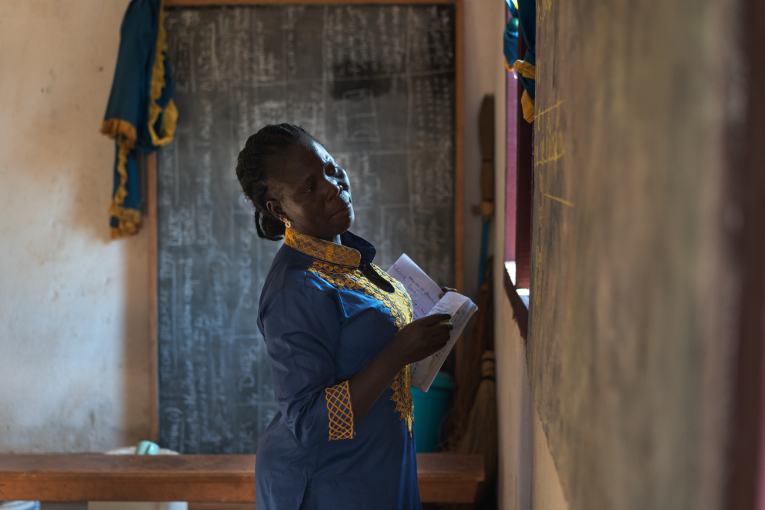
Damaris teaches the women in her neighborhood with enthusiasm and determinism.
Being able to read boosts sense of self-worth
Two years ago, when Finn Church Aid asked women living in the remote northwestern parts of the Central African Republic what kind of support they needed in their day-to-day life, among the first things that the women mentioned was wanting to learn how to read.
Based on these wishes, a Women’s Bank project was born, founded on the idea of improving the quality of life of women in the Bozoum region by offering them education in literacy and numeracy, entrepreneurship, and peace work.
Before, I didn’t even know how to spell my own name, but now I do. It feels wonderful.
Factbox
- Central African Republic is one of the most fragile states in the world. Learn more here.
- Anna Koskivuo, volunteer with Teachers Without Borders, together with a representative of the Central African Republic Ministry of Education, trained 18 literacy educators, who teach groups of 15 to 25 women three times a week
- The Women’s Bank project runs from 2018 to 2020 and incorporates subsistence, education, and peace work
- All activities are held in the women’s native language, sango
- The project benefits a total of 450 women
”In our community, we have many mothers who don’t know how to read, count, or write. These women deserve better opportunities to be in charge of their own life,” says Damaris, literacy instructor in one of the women’s groups.
Last year, she saw the Women’s Bank’s advertisement for recruiting literacy instructors, applied, and was selected. Damaris is motivated by seeing women she knows gain self-confidence through learning to carry out simple calculations and write their own name.
”If we had been allowed to go to school earlier, we wouldn’t be illiterate now. Before, I didn’t even know how to spell my own name, but now I do. It feels wonderful,” says Nafissa Yaya, 45, mother of six.
The women come from modest circumstances. Many of them had parents who chose to keep their daughters home to do housework, and arranged for them to marry young instead of sending them to school.
However, literacy and numeracy skills are strongly connected to coping with day-to-day life.
”Sometimes I get conned at the market, because I don’t know how to count or how much the change should be. I want to learn how to count in order to better plan my family’s finances and to be able to set aside some savings,” Nafissa continues.
Women and girls are often left outside education. According to an estimate by UNESCO (2010), only 24 percent of women in the Central African Republic know how to read.
Less than half of the adult population in Central African Republic is literate. The number is even lower what comes to women; according to UNESCO (2010), only 24 percent of Central African women can read.
Prolonged conflict and unstable history have resulted in poor levels of education. The influence of the former French colonial administration is still visible today; for example, the official language of instruction in Central African Republic is still French, even though the majority of the population, especially in remote areas, does not master the language. Children do not learn at school if they do not understand what the teacher is talking about.
Women’s Bank’s literacy training is held in sango, which is the primary language spoken in Central African Republic. Studying in sango has sparked enthusiasm and hope among the women about learning still being possible.
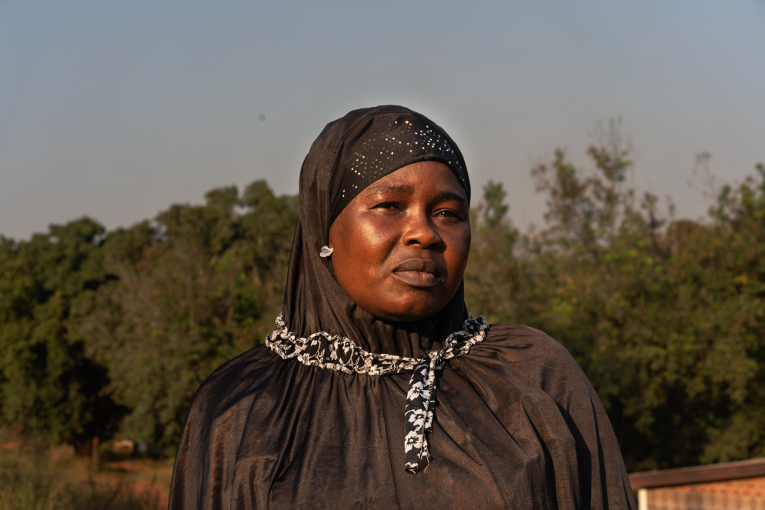
Mother of six, Nafissa, hopes that the training will help her find a job.
Hands full with work
Bozoum is a sleepy rural town with about 20,000 inhabitants, where everyday life is simple but filled with work.
When the sun rises above the hills of the town early in the morning, Damaris is already up. She starts the day by sweeping the ground in front of her home, just like the other women in her neighbourhood. It is important to keep one’s own yard looking tidy.
In Central African Republic, women are in charge of taking care of home and children. In the morning, the women walk together to go and work in the fields, and during the day, they sell their crops by the side of the road in order to provide for their families. Many have husbands working in the gold and diamond mines far outside of town. The fathers come home once a month, sometimes once every two months.
Although rich in natural resources, Central African Republic has had a rocky road to travel. The civil war that broke out in 2013 affected Bozoum as well.
Even though the situation is stable at the moment, many are worried about the future.
”There is still unrest in the regions surrounding the town. Only one fifth of those who ran from the war have returned,” says Damaris.
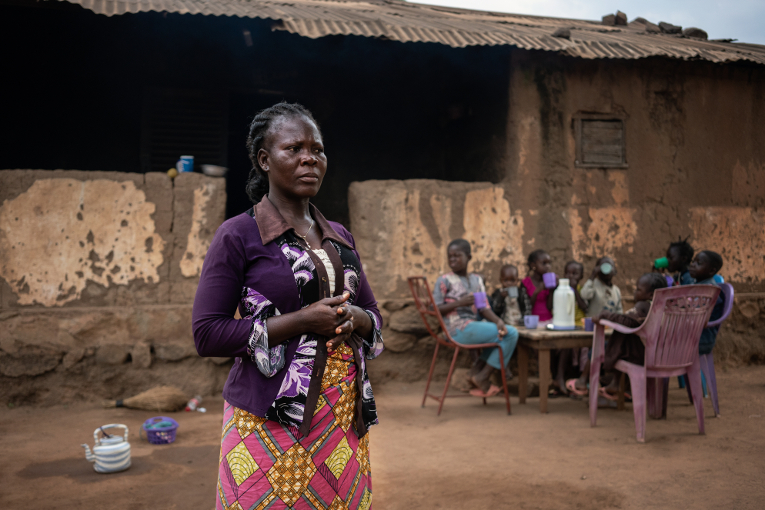
In addition to having two jobs and her own children to look after, Damaris takes care of the children of her brother who works at the mines located far away.
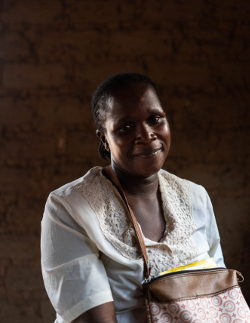
Laole after a literacy class.
The decreased population has affected the market as well.
”Business is not what it used to be. My family’s subsistence is on the line. I wish I was able to sell more,” says Laole Léocadie, 40, who recently became a widow.
It is not easy to bring food on the table; Laole provides for her six children by working in the fields. The youngest of the children is only two years old.
After her husband was taken away by an illness, the women’s group has become even more important to Laole.
”With the father of my children no longer with us, the other women bring security. It’s easier to have a savings fund and to go and work in the fields together”.
Hope in the middle of adversity
Alice Issoia, 47, has a kind face and a slightly sad smile. When Damaris writes on the chalkboard in sango, she follows attentively. Even Alice recently became a widow.
”My life has been hard since my husband died. I have to take care of our children and finances alone. Sometimes, when my children are fighting and money is tight, I don’t know how I’m going to cope.”
When Alice heard that there was going to be literacy training in her town, she felt her opportunity had come. Unexpectedly, learning to read and write has brought newfound joy into her days.
”The literacy training has given me something else to think about and offered me a moment’s escape from everyday reality. Now I have something of my own to focus on every now and then.”
Like many of her peers, Alice is illiterate. Alice lost her mother when she was still a child, so there was no one to send her to school.
”I go to Bible group at the church, but I don’t know how to read the Bible. I’m especially glad that I finally get to read and write in my own language, sango”.
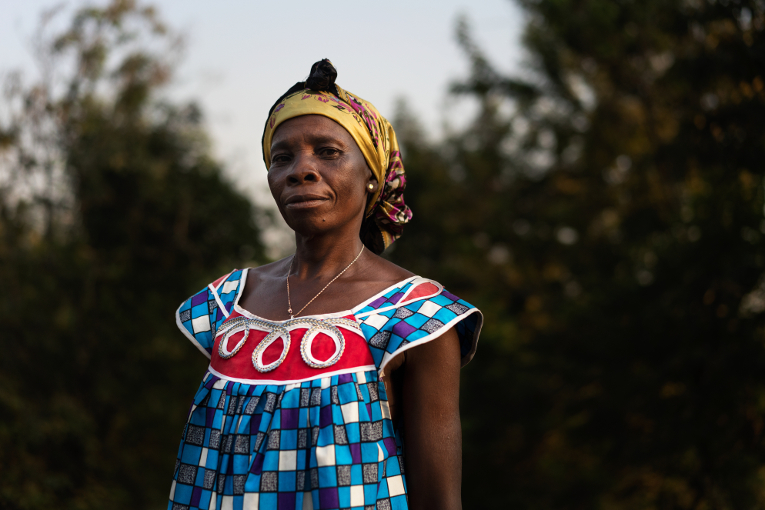
Alice has gotten newfound joy from learning to read.
Admirable perseverance
Despite the hardships, these women do not need pity. What they do need is tools to build a better life, piece by piece, using the same perseverance that has brought them this far.
”The women have showed their interest in the project, and they are committed to it. Now, whether we help them in the longer run is up to us,” says Timothee Yarawandi, coordinator for Women’s Bank.
The possibility of change even encourages the women to make plans for the future.
”I hope that this education can make up for never having been able to finish school. I can use the diploma I get from the training to prove that I can read and write. I hope it helps me find work. I would like to work as a waitress, for example,” Nafissa plans.
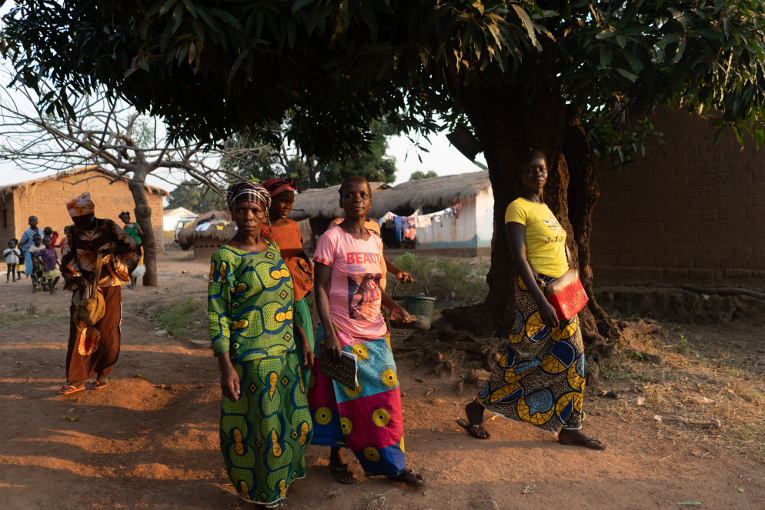
Women walking home after a literacy class has ended.
The evening sun paints the walls of the classroom golden. The two-hour literacy class is ending. Books are packed into bags, chairs are put back in their place. The women walking out the open door look more determined than the ones who walked in earlier.
Text: Elina Kostiainen
Translation: Leena Vuolteenaho
Photos: Fredrik Lerneryd
In Kenya’s poorest region, going to school requires great sacrifices, but David Edapal is convinced that education guarantees his daughter a good future.
There is a rustle of dry twigs as goats try to make their way out of their pen through narrow openings. 12-year-old Rebecca Atubo carefully guides baby goats into their own cage before letting the adult goats loose. Soon, the goats are ambling towards pastures in the gentle early-morning sun.
In a few hours, the temperature rises and turns to relentless heat, and it is hard to find shade in the desert-like environment.
”Herding is hard work when it’s so hot, and you’re thirsty all the time,” Rebecca describes.
Still, Rebecca is obedient and does what is asked of her.
For thousands of years, the nomadic people of Northwest Kenya have made their living raising cattle, and children have taken responsibility for the family’s goats and cows at a young age.
However, the distance to pastures has grown longer. There is no green in sight in the yellowish-gray landscape outside the family’s huts. Rebecca’s father David Edapal has been worried for a long time. He cannot say how old he is, but the lines on his face reveal he has seen several decades in Turkana, the poorest county in Kenya.
”The weather has grown warmer, and there are much fewer rains than before. In order to get water, we have to walk for two hours one way every day to get to the nearest river,” says Edapal.
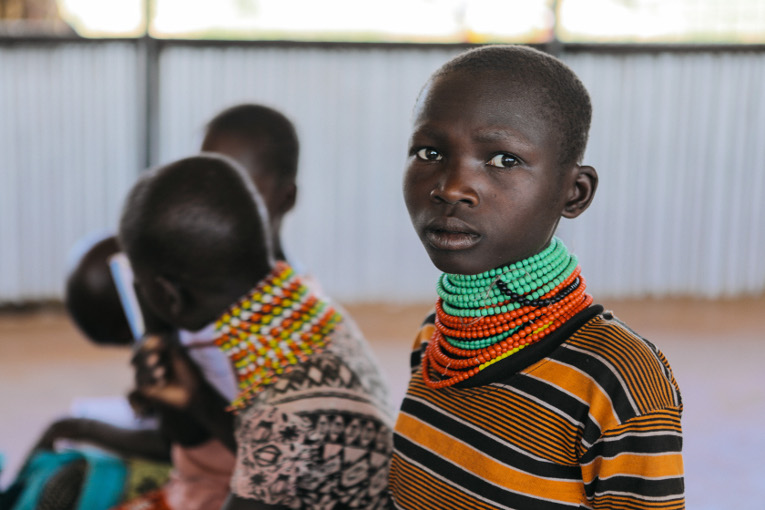
Rebecca says she prefers school to herding. Because of the heat, herding is hard work for both children and adults, and according to Rebecca, the thirst is the worst part.
Tested by drought
Severe periods of drought are testing Turkana more and more frequently. The drought in 2017 was the worst in decades. Hundreds of thousands of animals died due to lack of water as well as diseases.
This was a hard blow for the pastoralists, who traditionally move to follow the rains. Livestock are like a bank account on legs – they are used to fulfil all needs. Livestock provide milk and meat for food. Selling livestock brings in money to pay for things such as healthcare.
In addition, men need livestock to pay dowry to the family of the bride when they get married. The death of livestock hit families like an economic recession.
”Animals ravaged by drought cannot be sold or eaten, and they provide much less milk,” Edapal explains.
The crisis also fuels tensions among pastoralist people. They compete for the shrinking pastures, and extreme poverty makes stealing cattle a tempting prospect. A camel shepherd passing by carries an assault rifle on his shoulder to keep thieves at bay. Adding to the insecurity is a stream of firearms coming to Turkana across the border from neighbouring war-torn South Sudan.
For a pastoralist, questions about property are about as personal as asking a Finn about their salary. Most keep the number of livestock to themselves. However, Edapal reveals that cattle thieves took about two hundred of the family’s animals.
The family fled the insecurity into their current place of residence in the village of Ageles near the town of Lokichar. Edapal’s wife Aseken Namasi says all their hardships hurt her heart.
”The worst moment was when thieves killed four of my friends in front of my eyes when I was retrieving water,” she says. ”You can always get more livestock, but you can never replace a human being.”
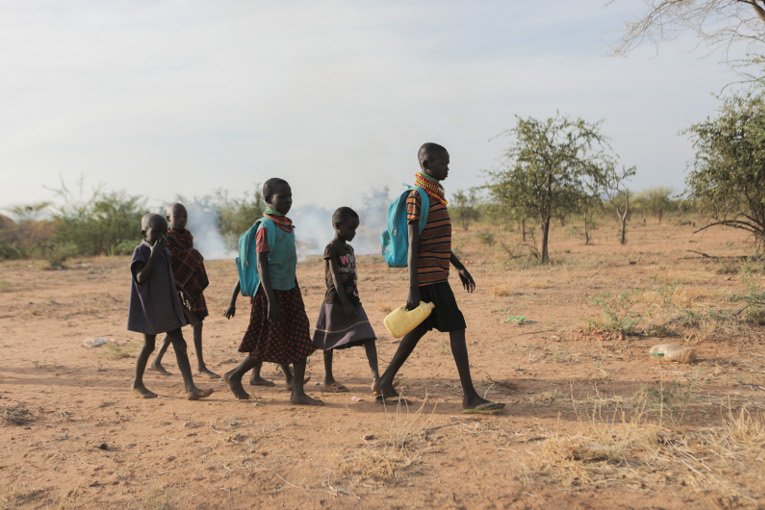
Rebecca Atubo, 12, (in front) walking to school with her friends. It is important to have the school close to home, as the journey to school is filled with danger in Turkana.
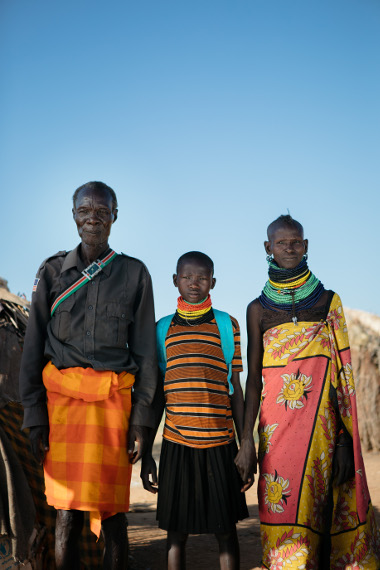
12-year-old Rebecca Atubo’s (middle) parents David Edapal (left) and Aseken Namasi sent their daughter to school. The shift from nomadic culture to a view of life that values education is seen strong in Turkana.
Almost all inhabitants of Turkana are pastoralists. Boys are brought up to raise cattle, and girls are expected to add to the family’s wealth by marrying. The dowry goes to the entire extended family.
Child marriage is still common. Because of the expectations of the traditional lifestyle, pastoralist people used to have little respect for education.
When Alice Loro Lele got to school age, her mother wanted her to go to school, but her father resisted. In anger, her father threw them both out, and with no livestock, they were destitute.
After comprehensive education, Alice could not afford to go to high school. Today, Alice is a 20-year-old mother of three, and lives in a hut in Lokichar with her mother.
”I married at 15, because I thought my husband would take care of us. I was foolish, and I didn’t know much about anything,” Alice says, clearly upset.
Her husband never paid dowry, which is another example of the plight of the nomadic people. As a gifted student, Alice got a job as a preschool teacher. She also started a general store. But her husband kept all the profits and started drinking. Alice gave birth to two children, but her husband did not care about them.
”When I was pregnant for the third time, my husband was going to get a second wife. I left him and moved back in with my mother,” Alice says.
Turkana lives under the poverty line
Places like Turkana are far from the reality of the capital Nairobi. Kenyan economy has grown at a rapid pace. Nairobi is teeming with skyscrapers, technology, and innovative mobile phone applications. In Turkana, most people live in villages with no electricity or running water.
In Nairobi, 22 percent of the people live under the poverty line, while in Turkana, the number is 88 percent. The disparity is largely due to education. In Nairobi, almost everyone has at least completed comprehensive school – in Turkana, 18 percent.
Pastoralists are moving into towns of Turkana with hope of work, but few of them even know how to read.
”We encourage families to send their children to school. More and more people see this as a solution in the long term,” says FCA education coordinator Miriam Atonia.
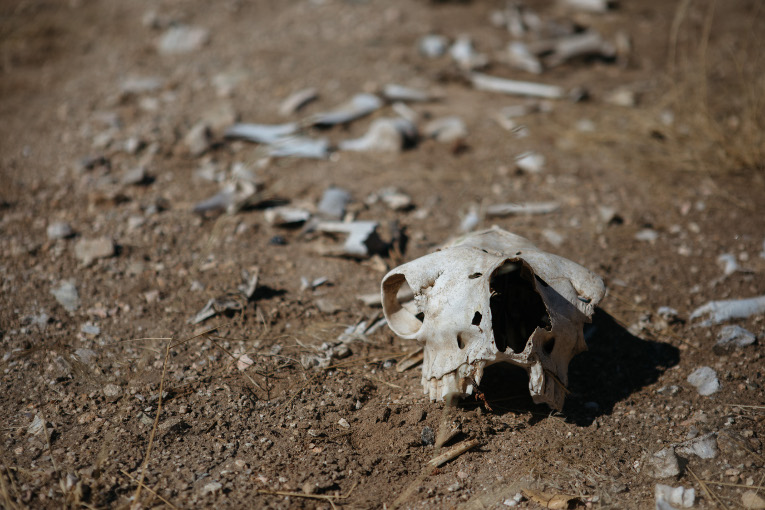
Hundreds of thousands of animals died during the drought of 2017. The drought had catastrophic repercussions for the nomadic people whose livelihood depends on raising cattle.
Things are moving in the right direction. Today, over half of the school-aged children and young people in Turkana go to school. Almost 27,000 started school in the poorest counties in Kenya in FCA projects during 2018.
Alice was offered a scholarship to study at a high school in Lokichar. She also thanks her mother for her support: mother looks after Alice’s children while she is at school.
”My heart breaks because I see my children so rarely. But we have to make some sacrifices; if we’re idle, we can’t improve our situation,” she says.
”I want to become a teacher because I want to encourage girls to go to school. I can give them the kind of advice I needed myself.”
It is hard to communicate the benefits of education to parents who have led a nomadic life. Edapal and Namasi did not go to school, but after a great deal of consideration, they decided to send their daughter Rebecca off to get an education.
”I have seen how the people of my generation, those who went to school, are succeeding. If we had received an education, we would be sleeping on mattresses, and our hut would have a tin roof instead of cloth,” he muses.
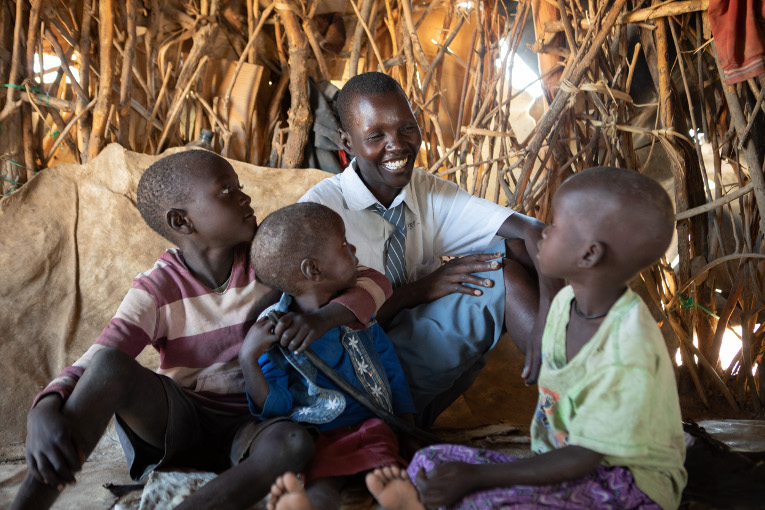
Alice Loro Lele (left) goes to school and takes care of her three children. She happy, that she decided to return to school.
A woman with an education is independent
After letting the goats out to pasture, it only takes Rebecca a few minutes of walking to get to the first lesson of the day. Edapal compares education to marriage – Rebecca is now married to school. An educated woman does not need to depend on others. She can make her own decisions regarding marriage once she is has finished her schooling.
Edapal feels proud when after her school day, Rebecca tells him about what she has learned.
”I hope Rebecca finds herself a job she likes, and God willing, can even help her parents in the future. Education provides lots of opportunities which I can’t even imagine.”
Text: Erik Nyström, Translation: Elina Vuolteenaho, Photos: Tatu Blomqvist / Ville Nykänen
Take part in the Common Responsibility Campaign at yhteisvastuu.fi, In addition, see the touching TV documentaries on the Yle channels starting from the beginning of February.
Savitri Devi Mandal welcomes us into her home. We sit in a small courtyard surrounded by rooms. Mandal’s sari is vibrantly colourful. Her silver jewellery, part of the local culture, speak of her position as a married woman.
”I am very happy now, especially when working in our restaurant,” she says.
Mandal, 39, lives with her husband, her mother-in-law and her four children in the village of Gonarpura in the Terai region in southeast Nepal. In recent years, the life of the family has taken a major turn for the better.
Life in Gonarpura today is much the same as it has been for hundreds of years. The beautiful houses by the banks of the river are made of a mixture of clay and concrete. The corners of the houses are soft and round, their roofs are made of straw, and no cars would fit to drive on the narrow sand paths between the houses – not that anyone has a car here. Water comes from the well. Big haystacks in the field in front of the village provide food for the cows. Chicken and goats populate the yards.
The region is beautiful but poor. Terai is an underdeveloped region even on the scale of impoverished Nepal.
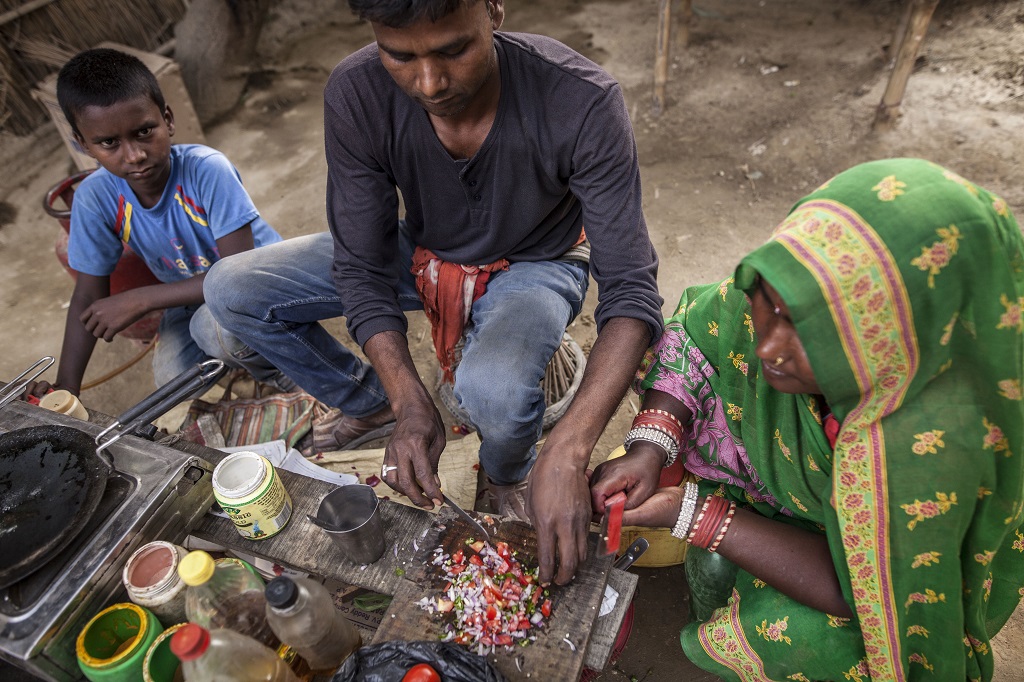
Savitri and Sankar are cooking, joined by son Saudi. Meat is not part of the restaurant’s menu, because it is too expensive.
Visibly proud, Mandal goes inside into one of the rooms for a gas cylinder and a small gas stove she got as entrepreneurial support that she drags out to show us. They helped her and her husband Sankar to start a ”restaurant.” They prepare and sell food at a small marketplace next to the village by a bridge crossing the river.
Something has changed in the village over the past few years – for the better. Finn Church Aid’s livelihood project has provided women with education and support for agriculture and small-scale entrepreneur activities, for example in the form of a cow or a sewing machine. New skills have brought wellbeing and decreased work migration to neighbouring country India.
”Forget about the dowry!”
”Now we can work together. My husband doesn’t have to leave home to look for work. We all have proper clothes. We are even able to put money away for saving. Our children are all in school, and we can afford to pay for school supplies and remedial education,” says Mandal, herself illiterate.
”Don’t save for the dowry yet, keep your daughter in school for as long as she wants to! It’s going to be long before she needs to marry,” advises Finn Church Aid’s project coordinator Arati Rayamajhi, when Mandal says her only concern is her daughter’s dowry. Daughter Laxmi is 13 years old.
Restaurant open every night
Savitri Devi and Sankar Mandal’s restaurant opens at four in the afternoon. 14-year-old son Chanchal transports the gas cylinder and stove to the marketplace with a push cart. Savitri and Sankar sit behind the stove, next to each other.
There are eggs on the table to make an omelette, with onions, tomatoes and chilli chopped as fillings.
They sit here every day until nine in the evening. ”However, I feel energised in the morning, because I don’t have to worry about something all the time anymore,” says Savitri Devi Mandal.
Text: Ulla Kärki
Photos: Veera Pitkänen
Peace is like an egg. It is delicate and fragile, but in the right conditions, it gives life.
Those are the wise words of the late Deka Ibrahim, who resolved clan conflicts in Wajir County in the early 90’s, and later became instrumental in the peace processes in North Eastern Kenya. She was my role model when I decided to start working for peace.
I developed a passion for peacebuilding coming from a predominantly Somali pastoralist community in North Eastern Kenya. The region experiences intractable violent conflicts within and between different clans and exacerbated by historical marginalisation, insecurity and violent extremism.
The need for peace building was dire, and my experience is that women have a lot to contribute in peace processes. However, in pastoralist communities, women are often excluded from them.
Despite my background, engagement and education, it has never been easy for me to build trust within the communities I worked in. Early in my career, I supported a local organization in a peace dialogue, but the clan and religious leaders did not accept me because I was a young single woman.
Not only men resist the involvement of women in peace processes. I once interviewed a local woman peacebuilder in Wajir County on women’s role in a peace process, and she looked at me and told me “why don’t you ask the men these questions before asking us, they know better, they represent us.”
That does not make sense. Women are a part of the conflict, just like men. In Kenya’s pastoralist areas, women contribute to promoting a culture of violence with the use of proverbs, poems and songs.
I currently work for FCA along the Kerio Valley, amongst the Pokot and Marakwet ethnic groups, where women sing and dance for young men after they return from cattle raiding.
I also vividly remember how women from one clan burned a dead body in Garissa town during a clan conflict. They were carrying machetes on the streets. It was shocking to see women at the forefront of violent clan conflict.
Through my years in this field, I have realized that involving women in peacebuilding requires a deep understanding of the cultural and religious context, and working closely with these communities to identify culturally suitable strategies to bring women on board.
With FCA, we have designed talking circles involving local women from the Pokot and Marakwet. Traditional mechanisms of conflict resolutions among communities are often most effective for building peace. Women have the power to prevent violent conflict for instance with the Leketio, a belt made of cowrie shells worn by women. The belt signifies fertility and motherhood.
When a woman removes the belt during violent conflict, the youth from both ethnic groups immediately stop fighting. This shows the immense role women can play in peacebuilding.
I try to oppose the resistance to involving women in peace processes by building trust and using strategies acceptable to the communities. I work closely with community leaders, as they are connectors to the society.
Deka Ibrahim was a mentor, who inspired me, and I hope in turn to inspire young women at the grassroots level to work for peace. This does not necessarily mean women need to get a seat in the council of elders. I believe there are vast opportunities for women to engage and claim their role in peace building at the local level. This in itself is a gradual process that we should be willing to take.
Aziza Maalim
The writer works for FCA Kenia office as a coordinator for peace work.
Learn more about FCA’s peace work here.
Women and girls learn to read and acquire new skills in the FCA/DCA project in two refugee camps in Bangladesh.
“I feel secure to work in the safe space for women and girls. I enjoy coming to this place and sharing with others,” says a refugee woman volunteering as a teacher. In Myanmar, she taught the national language Burmese and sewing.
Almost a million ethnic Rohingya now live in a cluster of camps in the Cox’s Bazar area in Bangladesh. They have fled Myanmar because of violence described in the recent UN report as mass murder and gang rape. According to the report, the intent of violence was genocide.
Most of the refugees are women and children. The situation of orphans and young women and girls in particular is very difficult.
”My dream is that the women and girls I teach could start to teach others. And that they could make a living for themselves.”
Support after violence
Education and livelihood opportunities are in short supply at the biggest refugee camp in the world. Especially education for young people is sorely needed.
A joint project by Finn Church Aid and DanChurchAid provides psychosocial support and education for women and adolescent girls who have experienced gender-based violence.
”Since the programme started we have reached 169 women and girls with basic literacy & numeracy lessons as well as 179 women and girls with life skills sessions, focusing on topics such as hygiene, nutrition and family planning. In addition, 765 women and girls have received psychosocial support, and our team has visited 1,050 families to tell them about the facilities and services aimed at women and girls,” says FCA education expert Petra Weissengruber who works at Cox’s Bazar.
Information sessions on hygiene, child marriage and disaster risk reduction have reached almost 1,400 women and girls. A questionnaire carried out at the beginning of the project revealed that there is a great deal of need and interest towards education. Also, there is a high number of women and girls that already have tailoring skills and reported that they would enjoy passing their skills on to other female refugees. The opportunity to do this has also been provided, and teaching has begun.
Conditions at the camp are harsh. People live in tiny shacks right next to one another.
”Fortunately, the monsoon rains have not been as hard this year as we feared. On the days it rains a lot, the education team can’t always make it to the camps. The rain that turns the roads at the refugee camps into mud obviously makes it difficult for the women and girls to reach the education facilities as well,” says Weissengruber.
Text: Ulla Kärki / Finn Church Aid
Photo: Tine Sletting Jakobsen / Dan Church Aid
Bunu Rai, 20, from Nepal, is training in Automobile Mechanics. There are very few female workers in the automobile industry in Nepal. But this is about to change.
“I want to change the perception of the society and the people. Women can do this work, even though it has been perceived to be only for men,” Bunu Rai says.
Finn Church Aid’s local partner organisation UCEP Nepal’s Sano Thimi Technical School in Bhaktapur near the capital Kathmandu has started to offer non-traditional vocational education for young women.
Rai has been learning a lot at the school and enjoyed her studies very much.
“When I’ve been studying and working with men, one thing I have learned is courage. I do not feel any awkwardness, I’m very happy. We students help each other.”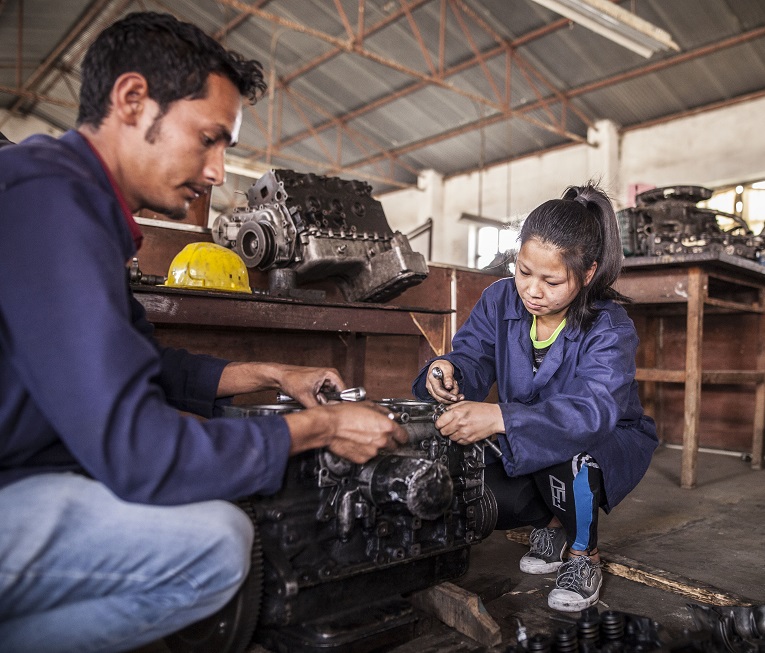
”Our society is patriarchal. I want change! I want women to be treated equally and have an equal place in the society.”
Rai says that in the past there was discrimination between daughters and sons in Nepali families. Often boys went to school and girls stayed home doing housework.
However, Rai’s parents always treated her and her sister and brother equally.
“My father used to work as a school helper. Perhaps he learned his good thinking partly from the school.”
At the Sano Thimi Technical School there are students from around the country, many living at the school hostel. Underprivileged youths such as youths from dalit or ex-bonder labour groups and youths from low economic background can get a scholarship for their studies.
After graduating, Bunu Rai wants to find a job or open her own workshop. In Sano Thimi, the training is followed by support to job placement or self-employment.
Text: Ulla Kärki
Photos: Veera Pitkänen
In the Palestinian regions, farming is one of the main sources of income for women, and a gateway to education for young people. Before Finn Church Aid’s (FCA) project, the people of Deir Ballout were on the brink of despair.
Cucumbers, okra, tomatoes, pumpkins, onions and plenty of grains. The fields spread out a long way to the left and right of the asphalt road leading to the village of Deir Ballout. A donkey is braying on 48-year-old Ibtisam Musa’s neighbour’s yard. It’s almost 11 AM, and around this time she usually prepares a meal.
”Normally I’m out in the field from 6 to 10 in the morning, and from 5 to 8 in the evening. When it’s this cloudy, though, the scorching sun doesn’t bother me,” shares Musa while doing some weeding.
Deir Ballout is called the bread basket of Salfit Governorate, home to 65,000 people. In addition to the crops, the farmers prepare and sell products such as couscous, honey, olive oil, cheese and za’atar spice blend.
However, the main product is Armenian cucumber, known among the locals as ‘snake cucumber’. According to Musa, everyone knows Deir Ballout for its snake cucumbers, and every year the village holds a festival to honour the plant.
”In the future, we’re also planning on trying to grow medicinal herbs,” says Musa.
For years, the farmers were unable to dream about the future. Before the collaboration with FCA that started in 2015, the villagers were desperate. Wild pigs had spread out in the area, and before long, destroyed crops were threatening to rob the locals of their work and self-sufficiency in food production.
”The wild pigs destroyed almost everything. Many people left their fields in search of other employment,” she says.
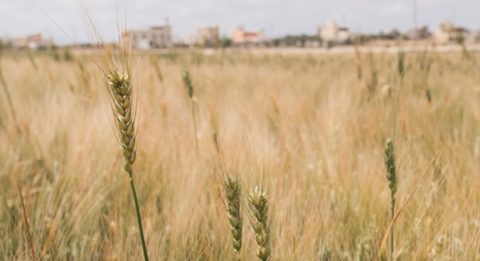
Deir Ballout is known as the bread basket of Salfit Governorate. Here, there’s a total of 1,2 km2 of fields, spreading out on each side of the road to the village. Photo Tatu Blomqvist
The ones to suffer firsthand were the women, who are in charge of most of the farming in the Palestinian regions. Musa is a member of a cooperative of 21 people, almost all of whom are women. Her income plummeted from over 7,000 euros a year to about 1,200 euros.
With support from FCA, the villagers solved the problem by building a fence around the fields last summer. The farmers returned, and one year on, the crop has been spared from the wild pigs. Musa’s income is returning to normal. She also praises the project itself for its effect on the community of 5,000 people.
”The building of the fence was carried out as a volunteer project. The success inspires the community to do more volunteer work, and it has increased our productivity”, says Musa.
With her income, Musa has paid for her children’s education. She has two sons and six daughters. Two of her children have graduated as engineers, one as a lawyer, and one as a teacher.
Musa has worked hard for her children’s education and earned the nickname “iron lady” from the other villagers.
”Our children are highly educated. Deir Ballout has produced doctors, ambassadors and members of parliament, working both here and abroad. It’s all thanks to our perseverance.”
Text: Erik Nyström, Photos: Tatu Blomqvist
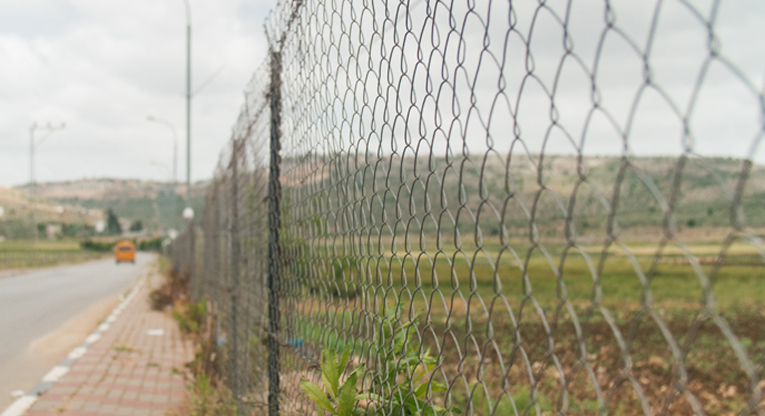
Finn Church Aid has helped the village of Deir Ballout to build a fence. Thanks to the fence, the farmers’ income is returning to normal. Photo: Tatu Blomqvist
We have all heard it when the alleged perpetrator of a crime says “I want to make a phone call”. It seems the right thing to say when you have been accused of a crime and you need help from your parents, guardian or a lawyer. We have all got used to hearing these same words used in countless TV shows that we take it for granted.
Finn Church Aid and its partners the Rural Human Rights Activist Program (RHRAP) and the Association of Female Lawyers of Liberia (AFELL) are embarking on a two year human rights project. The project is funded by the European Union, and it aims to monitor human rights violations in Liberian prisons and engage in proactive dialogue with authorities. As part of a comprehensive referral system, prisoners are given access to a telephone so that they can talk to their families, and those with issues of wrongful imprisonment can have access to lawyers.
That’s right access to a phone, a simple basic right!
Finn Church Aid and its partners will train Liberian police, prison guards, judges, lawyers and wardens and key people from communities on international human rights and prisoners’ rights standards. Beside the possibility to access phone privileges in the three target national prisons, prisoners will also enjoy pro bono legal assistance from selected lawyers to review their cases of incarceration.
Liberia in the past has gone through a brutal civil war and the latest Ebola epidemic has created a disorder of documentation of who is in prison and why. This practical and systematic project will give the Liberian authorities an overview if due process of incarceration has been followed.
The steps of incarceration should follow six basic steps. Complaint – arrest – court appearance – incarceration pre-trial – trial – release or detention.
According to RHRAP and AFELL, detainees have not been charged, have never seen a court, and have been put straight to jail by someone with power. Others have been on pre-trial detention for years without hope of seeing a court in the near future. This project will address the issue through a comprehensive approach, engaging the right people and institutions in finding long-lasting solutions.
The second part of the project is to strengthen the organisational capacities of partners to maximise their chances for international funding in the future and carry out quality work according to international standards.
Hoslo Jiwa
Country Director Liberia, Finn Church Aid
The project “Providing Access to Justice and Gender Sensitive Legal Awareness at Grassroots Level” contributes to enhance the rule of law and the respect of the fundamental human rights of the most vulnerable prisoners in Liberia, most often women and youth.
The project is implemented in Lofa, Bong and Nimba counties in Liberia in 2017–2018. It’s funded by the European Union – The European Instrument for Democracy and Human Rights (EIDHR).

Delegation of the European Union to Liberia
EIDHR: The European Instrument for Democracy and Human Rights
Project Fact Page

















